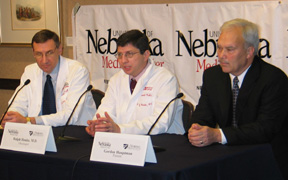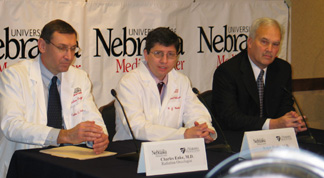 |
From left, Charles Enke, M.D., Ralph Hauke, M.D., and Gordon Hauptman. |
The protocol uses 45 high-dose radiation treatments (five per week) combined with one chemotherapy treatment per week over a nine-week period. The chemotherapy drug, docetaxel, works especially well because it sensitizes the cancer cells in the body, making them more receptive to the radiation. Docetaxel is also the most active chemotherapy agent for advanced prostate cancer.
The combination therapy has been used in three patients thus far. All of the patients have lymph node positive prostate cancer, meaning the cancer has spread from the prostate and is in more than one lymph node. It is estimated that about 20 percent of men diagnosed with prostate cancer have disease that has spread to the lymph nodes.
Typically, patients with lymph node positive prostate cancer are given hormone therapy alone or a combination of hormone therapy and radiation. Hormone therapy is never curative, but can lead to temporary remission of the disease, said Charles Enke, M.D., professor and chairman of the Radiation Oncology Department at UNMC and a radiation oncologist for The Nebraska Medical Center. On average, patients usually have remission for a couple years, then the cancer cells become resistant to the hormone therapy. Once the cells become resistant, the patient usually only survives about 12 to 24 months, Dr. Enke said.
Prostate cancer is the most common type of cancer found in American men, other than skin cancer. The American Cancer Society estimates that there will be about 232,090 new cases of prostate cancer in the United States in 2005. About 30,350 men will die of this disease. Prostate cancer is the second leading cause of cancer death in men, behind only lung cancer.
The success of the protocol is due in large part to the advanced Intensity Modulated Radiation Therapy (IMRT) system used at The Nebraska Medical Center. The IMRT approach allows the radiation oncologist to target both the prostate and the regional lymph nodes with significantly higher radiation doses than could be safely delivered with conventional techniques. IMRT has been previously used to deliver higher doses to the prostate but not to regional lymph nodes at risk. This approach also combines BAT (B-mode ultrasound targeting) of the prostate as a form of image guided radiotherapy.
The chemotherapy component was developed by Ralph Hauke, M.D., an oncologist for UNMC and The Nebraska Medical Center and the principal investigator on the clinical study. The radiation component was developed by Dr. Enke.
 |
From left, Charles Enke, M.D., Ralph Hauke, M.D., and Gordon Hauptman at Friday’s press conference. |
The protocol developed by Drs. Hauke and Enke is a Phase I investigator-initiated trial and was approved by UNMC’s Institutional Review Board and its Scientific Review Committee. Under the protocol, Dr. Hauke said three men were treated using the identical treatment regimen. At the completion of treatment, there will be an observation period to check for possible side effects resulting from the treatment. Thus far, mild diarrhea and fatigue have been the only side effects experienced by patients.
If no additional side effects occur, the trial will continue with three new patients enrolled into the trial. These men will receive slightly higher levels of chemotherapy than the first group received. “We want to determine just how far we can go without causing major side effects,” Dr. Hauke said.
He said the study is expected to continue over the next couple of years with the chemotherapy dose increased each time three new men are enrolled in the study. If significant side effects occur at a certain level, the trial will conclude at that point. As many as 30 men could eventually participate in the trial, Dr. Hauke said.
“By combining both radiation and chemotherapy, the hope is that we realistically can give these men a longer interval where the disease won’t bother them and hopefully even cure them,” Dr. Hauke said.
Gordon Hauptman, one of the first three men enrolled in the trial, gave high marks to the protocol and the medical center.
“This place is unbelievable,” Hauptman said. “I’m a lawyer who has practiced for 30 years. I’ve been to the medical center a lot (in conducting legal business). I had a misconception that it was a typical city hospital where everyone is a number.
“I’ve been to every corner of the medical center, and I’ve not had one bad experience. I’ve not even had one questionable experience.”
Hauptman, 57, is a partner with the Omaha law firm of Hauptman O’Brien Wolf & Lathrop, PC. Before seeking treatment at UNMC/The Nebraska Medical Center, Hauptman originally went to a medical center in Chicago to undergo surgery to remove his prostate. During the surgery, the doctors determined that the cancer had spread into the lymph nodes and removing the prostate was not his best option and that his quality of life would be better if he kept his prostate.
Hauptman asked the Chicago physicians where he should go for future treatment and suggested that he would be willing to go anywhere, including the Mayo Clinic. After a day of looking into places for Hauptman to receive treatment, the Chicago physicians said the best place for him to go was UNMC/The Nebraska Medical Center. They referred Hauptman to Dr. Hauke.
In November, Hauptman began the new protocol at the medical center, and he completed his last treatment on Jan. 19. He has returned to work full time and has experienced only mild diarrhea and fatigue.
“I thought I was living the good life, but this has given me a different outlook on everything,” he said. “It may be hard to believe, but this (prostate cancer) is the greatest thing that’s ever happened to me. It has truly re-lit my fire.”
For more information on the study, call (402) 559-8649.